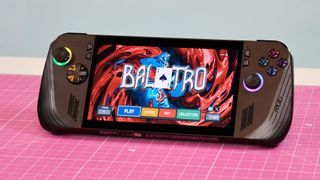Are you as horrified by the PS5 Pro pricing as I am? Just buy a gaming laptop instead, seriously
Judging by the absolute vitriol in the live chat on YouTube during yesterday’s PS5 Pro reveal, I wasn’t the only one upset by the price point of Sony’s latest and greatest console.
$699.99 (£699.99 / AU$1,999.95) is a lot to pay for a games console, let’s be honest. Seven hundred American dollaroos is just the base price, too – if you want the full out-of-the-box experience with a disk drive and stand, it’ll cost you $825 (£825 / AU$1,360). That makes it the most expensive home console ever; sure, inflation plays a role here, but even adjusting for that, the original 1994 PlayStation would cost you around $500 in today’s money.
Now, it might just be the seven zillion computer hardware reviews I’ve done over the years talking here, but surely we’re approaching gaming PC pricing territory here, no? I generally say to people building their first entry-level custom PC that they should aim for the $800-$1000 mark. With consoles – and games, and controllers – getting ever more expensive (and Microsoft no doubt wondering if they can feasibly sell an eight-hundred-dollar Xbox right now), it’s time for us to collectively admit that the home console dream is dead, and we should all be buying gaming systems that run Windows instead.
Getting a PS5 Pro PC equivalent
Alright, I’ll be totally upfront about one thing here: you’re not going to get anywhere near the same level of gaming performance on a PC at that price point. That’s just a fact: Sony’s tight control over the PlayStation ecosystem and the PS5 Pro’s fixed-spec configuration makes it cheaper to mass-produce a powerful console capable of 4K gaming.
I did some quick research (read: online shopping) and, at the $825 mark, the best you’re likely to get without waiting for big discounts on every individual component is a desktop system with an Nvidia RTX 4060 graphics card and an Intel Core i7 or AMD Ryzen 7 processor – certainly a solid gaming PC, capable of playing virtually anything at 1080p and some games at 1440p or even 4K if the game supports Nvidia’s DLSS 3 upscaling tech. If you’d prefer something a bit more portable, most of the best gaming laptops will, unfortunately, cost you more in most cases – though to be fair, they do include a screen, keyboard, speakers, and so on.
If you actually wanted to build an equivalent system to the PS5 Pro, you’d likely be looking at something closer to the RTX 4070 or perhaps AMD’s RX 7700 XT (I’ll admit that this is mostly guesswork, given that we don’t know the exact GPU specs of the PS5 Pro yet), along with a fairly high-end CPU, motherboard, and RAM plus a 2TB SSD. Chuck in a copy of Windows 11 and you’re likely looking north of $1200 – and that’s assuming you don’t want an expensive case or CPU liquid cooler.
But if you ask me, the benefits far outweigh this singular price-related downside. For starters, if you choose to build a custom gaming PC (or buy a pre-built system, like the rather excellent budget HP Victus 15L) you’ll have the freedom to upgrade your gaming machine further down the line – something that simply isn’t an option for console gamers, beyond perhaps swapping out the SSD to get more storage. Meanwhile, my desktop gaming rig has three SSDs in it…
PC is best, and I’m not sorry about that
Being able to upgrade in a piecemeal manner can help ease the burden of cost, too; it’s not uncommon for PC gamers to buy a new GPU or CPU and sell off their existing one to recoup some of the cost, and once you’ve got a PC, that’s it – you’ll never be left behind in the wrong console generation again, you can simply upgrade one part at a time until you’ve got the best gaming PC for you.
If you spring for a gaming laptop instead, you sacrifice most of that upgradability but instead secure yourself portability: the ability to pack up your gaming system and take it with you on the go can’t be understated. If you want something even more portable, the handheld space is no longer confined to Nintendo – excellent handheld gaming PCs like the Steam Deck and the Asus ROG Ally X let you take your favorite games anywhere, anytime.

It’s also worth discussing the fact that in this day and age, everyone needs a computer anyway – why not roll your work-and-play machines into one device? I’ve seen folks decry gaming PCs because they prefer couch gaming with a controller, but… you can literally do that with a computer. All you need is an HDMI cable and a gamepad, and boom: you can be gaming on Windows on your living room TV. Oh, and that gamepad is pretty much guaranteed to cost you less than a DualSense…
It’s all about the games
Finally, I’ve got to be honest with you, folks: console exclusives suck and I hate them. I say this as someone who grumpily forks out for every new Nintendo console so I can play Zelda, Animal Crossing, and Pokemon with my partner. Yes, I’m a big grown-up. With a decent chunk of Sony’s once-exclusive titles now making their way to PC, the ‘platform exclusives’ argument for buying a PS5 is weaker than ever.
Also, PC has something the closed ecosystems of console gaming will never have: a truly open indie dev landscape, where literally anyone can make their weird little dream game and sell it on itch.io, where an infinite number of titles await players, where it’s never hard to find exactly what you want to play. Add to that the multitude of free-to-play games and free giveaways from the likes of Epic and Prime Gaming, and it’s practically possible to game forever on PC without ever spending a penny on software beyond your OS.

Oh, and backward compatibility! I remember buying a PS3 back in the day and being immensely disappointed that my PS2 library was now effectively unplayable. Meanwhile, over on PC, I can download and play a game from the 90s with zero problems – not to mention the fact that those games are often insanely cheap, thanks to the excellent discounts you can routinely find on storefronts Steam and GOG. And don’t even get me started on paying a subscription to play online – that was the nail in the coffin for console gaming for me, personally.
Look, I didn’t write this article to try and convince Sony fanboys to come over to the light side – perhaps it’s more about vindicating myself for spending so much money on PC components over the years. But I genuinely, honestly, truly do maintain that PC is the best platform for gaming, and always will be. So if my writing convinces even one person to step into the wonderful world of PC gaming, I’ll consider this a job well done; hell, if you decide to get into PC gaming because of this article, send a tweet or an email my way – it would brighten my day no end.

